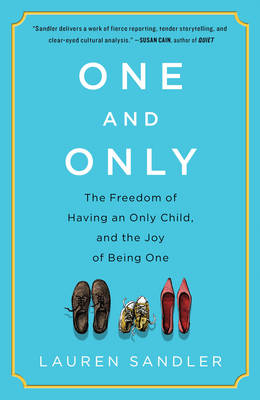
Lauren Sandler is an only child with an only child of her own, who found that discussing the choice to stop at one kid was loaded with anxiety, doubt, misinformation, and judgment. After investigating what only children really are like and whether stopping at one child is an answer to reconciling motherhood and modernity, she learned a lot about herself-and a lot about our culture's assumptions.
In this heartfelt work, Sandler demystifies the perceived problems of the only child and legitimizes a conversation about the larger societal costs of having more than one. We ask when people are having kids-never akid, never onechild at a time. If parents no longer felt they had to have second children to keep from royally screwing up their first, would the majority of them still do it? And, if the literature tells us-in hundreds of studies-that a child isn'tbetter off with a sibling and it's not something parents truly want for themselves, then whom is this choice serving?
One and Onlyexamines these questions, exploring what the rise of the single-child family means for our economies, our environment, and our freedom. Sandler considers hundreds of studies and interviews, traveling around the world to discover that only children are just fine, their parents often happier, and our planet is better off for them.
Sandler's controversial revelations will probably draw rebukes from the majority of parents who believe that having several children is the healthiest model for all members of a family. Others will claim that she's quite possibly cracked the code of happiness, demonstrating that having just one may be the way to resolve our countless issues with adulthood in our overtaxed age.
One and Only was such an encouraging read! As a fellow mother to an only child, it felt good to read that my concerns and fears are shared by other parents of onlies. I also gained understanding into a few of the reasons why adult onlies sometimes make such impassioned cases against their friends and family members having singletons.
A recurring theme in the book is "contrary to popular belief." I almost thought it should be the book's subtitle! It seems most of the myths about only children (and their parents) are purely anecdotal and not supported by research. I love that Lauren Sandler points out faulty and subjective reasoning when it occurs, especially when it's one of the many, common arguments against having an only child. Sandler also explores some of the sociological reasons behind the thought that onlies are unnatural. No matter what studies show, this perception seems to be deeply embedded in our culture. It's very hard to counteract. Sandler portrays this struggle well, and I felt a camaraderie with her because of that.
I wish Sandler had been a little bit more specific in her language in the chapter "The Fruitful Mandate." She used all-encompassing phrases such as "the faithful" and "church communities" when the specific behaviors and beliefs she was referring to apply to the Christian right. The people she interviewed and quoted regularly made this distinction, but you have to read between the lines to realize Sandler does, too.
The conclusion, "Against Folly," was amazing. Sandler's voice really shines through in these pages, and it's easy to feel a connection with her. And there is a powerful, powerful quote by Alice Walker's mother which touched me personally. The conclusion wraps everything up nicely; a difficult task, considering how multifaceted the topic is.
I received a copy of this book from the publisher via NetGalley. I did not receive any other compensation for this review.
Reading updates
-
Started reading
-
27 February, 2013:
Finished reading
-
27 February, 2013:
Reviewed
